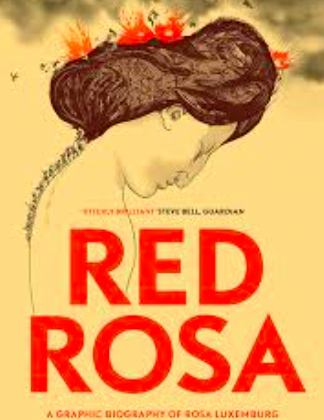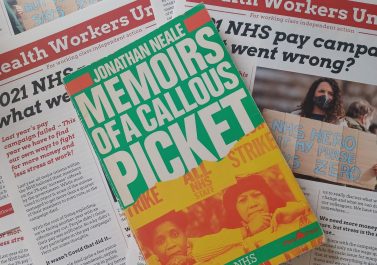In an interview, Kate Evans, the author and artist of Red Rosa, admitted that when she was initially approached about it, she did not know who Rosa Luxemburg was. Evans did, however, do meticulous research that informed how her pictures were drawn, and she also used Luxemburg’s own political writings to convey her inner and political life. The book is lively and characterful, its main goal attempting to draw Luxemburg as a whole person. By this, we mean that Evans includes a lot about Luxemburg’s friendships, and her romantic and sexual life, as well as trying to convey her political ideas.
It’s all too easy for writers and historians to focus solely on the public face and achievements of important people; but here, it’s clear that a feminist critique (i.e. ‘the personal is political’) informs Evans’ attempt to show that Luxemburg’s private life is not wholly separate from that which is publically shown and revered. Showing the more private aspects of a life should shed light on the context of their actions and convictions and break down this notion that people, especially famous people, are islands: self-contained, unique heroes who become reified and worshipped (or reviled). Their human aspect disappears and they become waxworks in a museum. However, are we alone in thinking that this uncovering of private life is deemed a bit more necessary in biographies of women, rather than simply letting their work speak for itself? We certainly feel that the book gives more weight to Luxemburg’s ‘personal’ life – her relationships, friendships and sex life – than to her economic and political ideas. The constant references to the more personable ‘Rosa’ is a particular bugbear when we never refer to Lenin as Vladimir, or Trotsky as Leon, or Marx as Karl. So in this tradition, this article sticks to calling Luxemburg, Luxemburg.
Private life of course, is always social: we interact with others, learn from and are influenced by them. Luxemburg was intensely so: she was political in an all-encompassing way, and so like many revolutionaries who give their lives to the cause, this split between ‘personal’ and ‘political’ cannot hold. She lived and breathed revolution, too, so in portraying her life, understanding the political context of the time is paramount.
In the case of ‘Red Rosa’, Evans slightly misses the mark by failing to properly engage with the varied and pressing political debates of the time – both within and outside the political party of which she was a member – without which, a proper understanding of, and engagement with, Luxemburg’s works is difficult.
The book largely understands Luxemburg’s political fervour through her identity. Of course, being a disabled Jewish woman was massively formative due to the barriers she had to experience and overcome without losing herself or her convictions. Evans impressively portrays the misogyny and anti-semitism that runs deep – even amongst her so-called comrades – as well as Luxemburg’s largely oblivious attitude towards it, which enabled her to not let it consume or derail her. But these personal experiences alone cannot explain some of the ongoing questions and debates around Luxemburg’s life and work, such as: why did she stay so loyal to the German Social Democratic Party (SPD) for so long when she disagreed so vehemently with some of their politics? Why did she write truly revolutionary work, yet remain loyal to forces that wanted to undermine the revolution?
These questions are especially pertinent now, when large swathes of the so-called ‘revolutionary’ left have joined the Labour Party and think that parliamentary politics can, even in some tiny ways, resolve the contradictions of capitalism. Objectively, Luxemburg was an amazing woman, and we do not want to suggest she was not. However, the glowing representation here of all aspects of her personality risks reifying her as an infallible hero of the radical movement, which in turn makes it more likely people will assess her work with less critical nuance than it deserves.
Reform or Revolution (1900) is a case in point. Luxemburg wrote this article early on in her membership of the SPD. Here, she takes on Eduard Bernstein’s view that the contradictions of capitalism do not necessarily deepen, and that the system has stabilising methods that make reform, rather than revolution, a more realistic way to overcome it. She staunchly defends the need for revolution rather than reform, but it would be wrong to imply, as Evans does, that she was somehow at the vanguard of revolution at that time – a widespread international movement criticizing social democracy already existed and was actively sidelined by Engels and the Second International, including groups like ‘Die Jungen (‘the young ones’), active in Berlin between 1889-1892; a group around Gerson Trier in Denmark who were excluded from the Danish Social Democratic party in 1889; Bergregen in Sweden, the revolutionary socialists grouped around William Morris in England; and later on, the socialists working in revolutionary unions, such as Tom Mann in England and F.D. Nieuwenhuis in Holland etc., not to mention the revolutionary syndicalism of the IWW (Industrial Workers of the World) or class struggle anarchists like Malatesta in Italy. On a smaller scale, groups and individuals sharing the same positions existed in France, Italy, Spain, the US and Japan.
All this rich revolutionary history is important to think about in the story of Luxemburg because she was not writing or acting in a vacuum, and her ideas should be seen in the context of other groups’ work in order to assess their ‘radicality’. If we did this, we would see that not only does she not question the SPD and its role in creating reformists and reformist theory in Reform or Revolution, but she still advocates struggling inside reformist institutions, if only to say that real systemic change will not happen by doing so.
This of course begs the question: well, why bother then? Why put your energies into struggles inside unions and political parties if you know that they’re not the vehicles through which revolution will come? In our experience, most people who get sucked into party or union machines are eventually forced to turn to something more radical, because they inevitably come up against the limits of these organisational forms; or otherwise – or as well – get burnt out, demoralised and end up wearily justifying their own increasingly obvious political contradictions. All those canvassers getting out there to encourage working class people to vote for the Labour Party in the last election lose trust in those people (the canvassers) when the inevitable compromises that Labour would have to make start to kick in, and working class power does not increase as a result.
Luxemburg does not answer this question sufficiently in Reform or Revolution, and while there is some evolution in her later writings in terms of the structural consequences of focusing on parliamentarism, it does not lead to a qualitative shift in her own political activities. But why does this matter? Instead of leaving the SPD earlier to develop an organisation of her own that would have been strong enough to channel the revolutionary impetus after the First World War, she chose to continue to work within the parameters of the party. The formation of a revolutionary organisation as a rallying point for workers would have been crucial earlier on (after the outbreak of WWI) and would undoubtedly have made a difference to the 1918-21 revolution in Germany – as it was, the Communist Party of Germany (KPD), which formed in 1918, and whose left wing split into the KAPD in 1920, was formed in turmoil, and had little chance of taking root outside the major industrial areas. And who knows, it might have saved her life, given the linking up of the SPD, Freikorps (the right-wing paramilitary groups) and fascist forces. Evans could have focused her attention more in this area in order to exemplify the illusions and delusions many of us labour under (pun intended!), and which has huge ramifications for how we organise and think about revolution today.
Arguably, it is the question of ‘reformism’ that is most relevant to us today, as the fractious and disorientated ‘left’ in the UK has been stuck in a Trotskyist/social democratic rut for a very long time. Looking at the widespread defection from grassroots organising to election canvassing during the election campaigning months, lessons have evidently not been learned about placing your faith in parliamentary democracy. This dissonance between one’s revolutionary ideals and the pragmatic imperatives of the here-and-now – a dissonance which recurs throughout history – is certainly alluded to in Red Rosa, but it very much deserves closer analysis. For example, while, on the one hand Luxemburg states that “bourgeois parties collude, with their electoral tricks, to keep us out of office,” she at the same time demands a more democratic electoral system: “let us fight for equal suffrage!”, as if the ruling class would allow anything – including this – to actually change the balance of class forces. And when she publically breaks with Karl Kautsky in 1910 (one of the main theoreticians of the SPD) because of political differences, she nevertheless remains loyal to the party.
In her paper, Organisational Questions of the Russian Social Democracy (1904), Luxemburg criticises Lenin’s interpretation of the roots of revisionism as essentialist and begins to explore the ways in which parliamentarism develops reformism, class collaboration and careerism, as well as the division between intellectuals and workers, leadership and underlings. It’s worth pointing out that these tendencies are also present in socialist organisations, and therefore they end up reproducing the passivity of the masses rather than working to overcome it. All of this is very promising, but it seems that the practical implications (i.e. to leave the party and start cadre building) were never fully drawn by Luxemburg.
At the time, these contradictions could be answered by pointing to: the legal status of the SPD (from 1878-90, any grouping or meeting that aimed at spreading socialist principles was banned under the German Anti-Socialist Laws, so putting forward independent candidates in elections was a strategy to get around this. This electoral strategy then continued when the ban was lifted); another factor was that the SPD was growing in size and popularity year on year and so anything seen as ‘rocking the boat’ was stifled; there also had not been an economic bust for many years, which tested Marx’s theories of cycles of crisis and opened the door for more reformist theories to gain popularity. We could also make the point that the Second International was always rooted in the bourgeois political system, given that it was created at a time when there was no real revolutionary perspective – so there was not a reactionary turn so much as it was built to act within the parameters of reformism, from its very inception. Evans highlights the fact that there were individual, idiotic, self-serving men within the it who blocked revolution – which, although it might be true – is a shallower explanation for why the SPD was, at its core, reactionary.
Although she was on the left of the SPD, Luxemburg clearly felt it was impossible to do anything meaningful outside it at the time. The SPD had mass support, and one can understand the idea that leaving it would be seen as both sectarian and ineffectual. You can understand why someone would want to stay ‘where the workers are’, but in this case, the first question would be what kind of workers were in the SPD at the time (i.e. there were more of those in the higher ranks); and then, in that case, revolutionaries would have had to have made a principled rupture with the more established labour movement, even if this meant being in a minority position for a while, like Lenin was. But Luxemburg never made these points publicly, which renders her political attitude ambiguous. She shares the SPD leadership tendency to think that some analysis should not to be publicized because the political climate may not be welcoming to it; however, the question to ask here is – at what cost?
Today, many different and opposing strands of Marxism are able to draw from Luxemburg’s work, from the International Luxemburgist Network, who advocate for the democratic self-organisation of workers, to the Rosa Luxemburg Foundation, the think tank of a bourgeois austerity party. This probably says something about the somewhat indecisive nature of Luxemburg’s writings – they end up pleasing everyone.
Despite her contradictions and equivocations, Luxemburg was a lucid writer, with profound historical understanding and perspective. The fact that this never solidified into a more practical proposal for workers’ self-organisation, based on her ideas of revolutionary ‘spontaneity’ (i.e. spontaneous uprisings from below, without the vanguard leading the way), is a shame. She criticised the gap between the leadership and the masses but never managed to take steps to overcome it, either theoretically or organisationally (as far as we know, the Communist Party of Germany that she set up never really tackled it – it never offered a fundamentally new way of working class organisation). Maybe the concurrent anarchist debates could have offered a bridge towards it, but due to a hangover from the debates between Marx and Bakunin around the time of the First International, there was a deep hostility to anything anarchism-related and a virulently anti-anarchist reflex, even amongst those on the left of the SPD.
Anachronistic?
Evans wants to make Luxemburg’s writings relevant to a modern audience. She does this by making comparisons between then and now: e.g. Luxemburg’s ideas of capitalist crisis and the use of credit, which only defers the crisis, and the financial crash of 2008; and her thoughts around how expanding markets linked historically to imperialism and war, and how this fits in with more recent ideas of globalisation and the military-industrial complex. While we can understand why Evans wants to draw parallels between Luxemburg’s theories and today’s world, it does mean that she chooses to highlight certain threads at the expense of others. More specifically, she highlights the parts of Luxemburg’s analysis that mirror the vague leftist mantras of today (globalisation, the credit crisis, the decline of the high street, etc.) whilst avoiding anything that might offend the prevalent left liberal climate, e.g. Luxemburg sharply criticised the cooperatives movement in Reform or Revolution – she opposed just giving ‘land to the tiller’ and emphasised the need for collectivisation in agriculture in The Russian Revolution (1918); she attacked Lenin for giving in to national independence movements in Ukraine and proposed the handing out of weapons to all workers, rather than accepting the state’s monopoly of violence and the need for a standing army.
Evans obviously cannot say everything in this book but there is a filter at work, and this should be mentioned, if only to highlight the reader’s attention to the fact that Luxemburg’s Marxism do not dovetail so easily with today’s generic ‘anti-global’ or ‘anti-capitalist’ protester, despite Red Rosa’s insistence on a direct link between today’s Twitter-friendly activists and Luxemburg’s work. There is one point where Evans does seem to criticise Luxemburg (albeit with a wry smile) – her relationship with her maid. While Luxemburg is busy doing her intellectual work, scribbling away furiously about dialectics and the contradictions of capital, she is being looked after by her maid, her labour vital to Luxemburg’s mental work. Not only does Luxemburg seems totally oblivious to the division of labour (no doubt like most other revolutionaries, including Marx), this also shines a light on the lived contradictions of capital, the differences in social relations that we often take for granted, and the complex, problematic division between intellectual and manual labour that communism aims to overcome. At the same time, it illustrates Luxemburg’s own criticisms of feminism – in other words, a gender analysis without a class analysis is only ever half the story. Further still, it hints at an uncomfortable relation between the ‘full-time revolutionary’ or activist and the masses of working class people, who never seem to have much of a voice in history books.
Red Rosa’s tendency towards hagiography, then, does occasionally let up. But rarely; and although Luxemburg was an exceptional person, viewing her through such a hagiographic filter brings us no closer to understanding her more mysterious – and absolutely critical – choices – this indecision at the point of revolution, and this ultimately costly loyalty to the SPD. This all too ‘human’ foible – of believing in one thing and doing another – would perhaps have been a more interesting and relevant thread to ponder in respect to one’s ‘humanness’ than, say, Luxemburg’s sex life. But maybe we are being a bit harsh – after all, honest representations of women’s sex lives, even in the 21st century, are rare, so it’s certainly refreshing to see one attempted for a women at the turn of the 20th century. While there are hints of some artistic licence in making Luxemburg’s relationships seem relatable to women today (e.g. we are not sure that her supposed neediness towards Jogiches is reflected in her private letters), it is always necessary to smash the idiotic stereotype that a woman can be either intellectual or sexual.
As a book for beginners, Red Rosa certainly covers a lot of ground. Evans smartly conveys the exciting times of revolutionary ferment across Germany and Russia, and we get a firm sense of Luxemburg’s vivacious, spirited personality. Hopefully, it will encourage more people to critically engage with the questions opened up in her work, rather than just see her as a feminist poster girl for revolution.
————
Kate Evans is a cartoonist, artist, and activist. She is the author of numerous books and zines including Bump: How to Make, Grow and Birth a Baby and Funny Weather: Everything You Didn’t Want to Know about Climate Change but Probably Should Find Out. She was awarded the John C. Laurence Award in 2016



